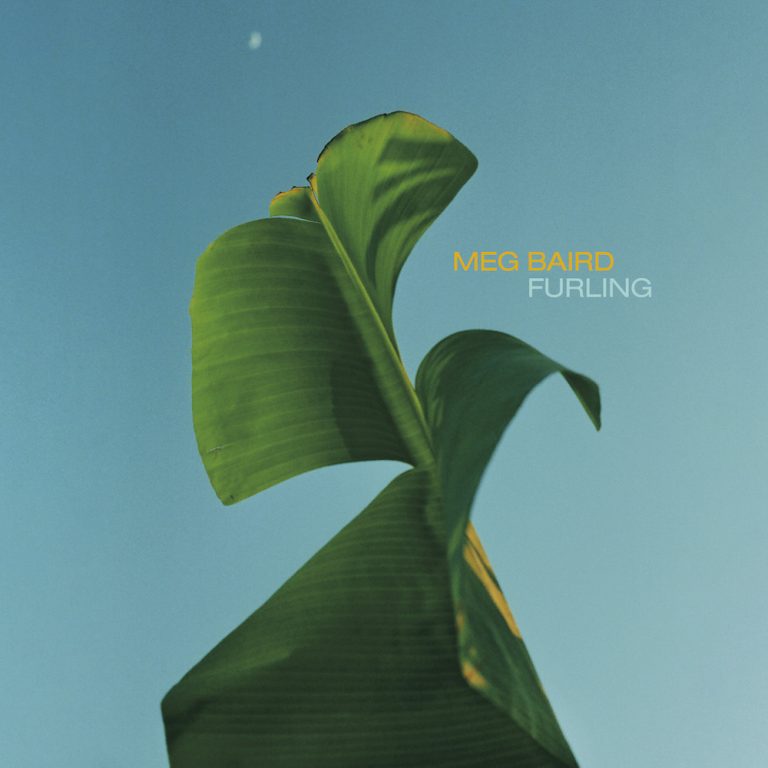Few artists can conjure the feeling of hovering just above a sunlit sea, perhaps with an autumnal breeze tussling your hair, as adeptly as Meg Baird. Over several solo albums since departing her experimental, psych-leaning band Espers, Baird has carved out a lovely little spot for herself amidst the singer-songwriter set. Blending in sparkling wisps of folk, jazz, and gentle psychedelia, starting with her 2007 debut Dear Companion, Baird has proven herself one of the finest voices in the scene, which is further exemplified by her serene and gauzy fourth record, Furling.
Anyone who’s been paying attention to Baird’s work over the years likely knows her as a deeply talented guitarist, weaving surprisingly complex progressions, both picked and strummed. Here, though, Baird grounds her sound partially in another wooden world of sound: the piano. It’s not that the instrument has never appeared on a Baird record, but it takes on new significance on Furling, sometimes being an anchor and other times a mercurial augmentation.
The opener “Ashes, Ashes” is buoyed by a subtly growing piano figure, buffeted by foggy cymbals and Baird’s heavenly voice singing in wordless melody. It’s somewhat surprising for Baird to start off with a wordless cut — in addition to being a great guitar player, Baird is also an evocative and moving writer — let alone having it be the longest song on the record. But “Ashes, Ashes” serves as a glistening and inviting way into the record; it’s an enveloping epic unto itself.
From here, we get more of what Baird does so well. Even though she dabbles in louder sounds with some other acts, like playing drums in her band Heron Oblivion (whose Charlie Saufley co-produces this record with her), this record flows out like a warm rain. Once Baird’s lyrics enter the frame, trafficking in her frequent fascinations like the passage of time and memory, the eight songs that follow are alternately heartrending, touching, and deeply human. Her feathery but strong voice cascades, siren-like, atop the shimmer.
“Star Hill Song” sets us off with some gently woozy, Mazzy Star-like guitars, pace-keeping bells, and humming keys. Baird sings of resting, quietness, and how she can “feel the beating of another’s heart,” while a mix of drums and hand percussion hang out beneath. There’s a shaggy, sunny beauty to it, Baird’s voice cresting with the waves. “Ship Captains” is much starker, its high piano keys nestling it up in a more moonlit, icy stratosphere. Baird’s vocal harmonizes closely with her own, as the instrumental deepens, thatching into a gorgeous snowscape of voice. The gauzy “The Saddest Verse” is all morning vapor, as Baird sings lines like, “Experience was made / It’s bound to be so rare.” Her deft guitar work blends lovingly with guest Mary Lattimore’s blissful harp accents.
Furling is a surprisingly dense record, its sonic pallet feeling deep and widescreen, even in its sparsest moments. “Cross Bay”, which was released months back in a demo form, is mostly just Baird’s singing and her unassumingly complex plucked progression. The song flits between more major and more minor realms, as she sings simply devastating lines like “Just call out my name / And you’ll see / It’s really not the same one anymore.” The production on the track keeps it feeling hefty despite its spareness, with the low end blending in well with her breezy voice.
It’s a little funny that Baird chose to call this record Furling instead of “unfurling,” as so much of it ambles outward at its own pace, opening up and stretching across the canvas. It’s one of her most enveloping releases. Coming about eight years after her moody (and vastly underrated) Don’t Weigh Down the Light, this album is a heart-tugging beam of dewy sun, but it’s not without its darker edges. Those moments on “Cross Bay” where she can flip from bright to dusky in a blink, or the piano-led closer “Wreathing Days”, with its Grouper-like room tone almost swallowing it up, its pedals acting like percussion. Near our end comes Baird, weary-voiced and liberally blending her syllables, until the still life at the core of the song — phrases like “dream away” and “see rain” and “bye bye” — is all that remains. It’s a trick Baird is especially skilled at deploying: a simple set up, a nearly-imperceptible shift or two, and before you know it, a sparkling ice statue stands before you, whispering life’s riddles into your ear.

